Articles
- Page Path
- HOME > J Korean Acad Nurs > Volume 43(1); 2013 > Article
-
Original Article
- Transcultural Self-efficacy and Educational Needs for Cultural Competence in Nursing of Korean Nurses
- Sun-Hee Kim
-
Journal of Korean Academy of Nursing 2013;43(1):102-113.
DOI: https://doi.org/10.4040/jkan.2013.43.1.102
Published online: February 28, 2013
College of Nursing · Research Institute of Nursing Science, Catholic University of Daegu, Daegu, Korea.
- Address reprint requests to: Kim, Sun-Hee. College of Nursing, Catholic University of Daegu, 3056-6 Daemyeong 4-dong, Nam-gu, Daegu 705-718, Korea. Tel: +82-53-650-4831, Fax: +82-53-650-4392, sunhee421@cu.ac.kr
© 2013 Korean Society of Nursing Science
Abstract
-
Purpose
- This study was done to investigate the level of transcultural self-efficacy (TSE) and related factors and educational needs for cultural competence in nursing (CCN) of Korean hospital nurses.
-
Methods
- A self-assessment instrument was used to measure TSE and educational needs for CCN. Questionnaires were completed by 285 nurses working in four Korean hospitals. Descriptive statistics, t-test, ANOVA, Pearson correlation coefficients, and multiple regression were used to analyze the data.
-
Results
- Mean TSE score for all items was 4.54 and score for mean CCN educational needs, 5.77. Nurses with master's degrees or higher had significantly higher levels of TSE than nurses with bachelor's degrees. TSE positively correlated with English language proficiency, degrees of interest in multi-culture, degree of experience in caring for multi-cultural clients, and educational needs for CCN. The regression model explained 28% of TSE. Factors affecting TSE were degree of interest in multi-culture, degree of experience in caring for multi-cultural clients, and educational needs for CCN.
-
Conclusion
- The results of the study indicate a need for nurse educators to support nurses to strengthen TSE and provide educational program for TSE to provide nurses with strategies for raising interests in cultural diversity and successful experiences of cultural congruent care.
- 1. American Association of Colleges of Nursing. Tool kit of resources for cultural competent education for baccalaureate nurses. 2008;08;Retrieved June 20, 2012. from http://www.aacn.nche.edu/education-resources/toolkit.pdf.
- 2. American Association of Colleges of Nursing. Tool kit of for cultural competence in master's and doctoral nursing education. 2011;08;Retrieved June 20, 2012. from http://www.aacn.nche.edu/education-resources/Cultural_Competency_Toolkit_Grad.pdf.
- 3. Andrews MM, Boyle JS. Transcultural concepts in nursing care. 2008;Philadelphia, PA, Lippincott Williams & Wikins.
- 4. Bandura A. Self-efficacy in changing societies. 2008;Cambridge, Cambridge University Press.
- 5. Brennan AM, Cotter VT. Student perceptions of cultural competence content in the curriculum. J Prof Nurs. 2008;24(3):155–160. http://dx.doi.org/10.1016/j.profnurs.2008.01.003.ArticlePubMed
- 6. Calvillo E, Clark L, Ballantyne JE, Pacquiao D, Purnell LD, Villarruel AM. Cultural competency in baccalaureate nursing education. J Transcult Nurs. 2009;20(2):137–145. http://dx.doi.org/10.1177/1043659608330354.ArticlePubMedPDF
- 7. Campinha-Bacote J. The process of cultural competence in the delivery of healthcare services: The journey continues. 2007;5th ed. Cincinnati, OH, Transcultural C.A.R.E. Associates.
- 8. Choi YH, Kang SP, Ko SH, Cho MO. Nursing and Korean culture: An ethnographic approach. 1992;Seoul, Soomoonsa.
- 9. Coffman MJ, Shellman J, Bernal H. An integrative review of American nurses' perceived cultural self-efficacy. J Nurs Scholarsh. 2004;36(2):180–185. http://dx.doi.org/10.1111/j.1547-5069.2004.04032.x.ArticlePubMedPDF
- 10. Cuellar NG, Brennan AM, Vito K, de Leon Siantz ML. Cultural competence in the undergraduate nursing curriculum. J Prof Nurs. 2008;24(3):143–149. http://dx.doi.org/10.1016/j.profnurs.2008.01.004.ArticlePubMed
- 11. Giger JN, Davidhizar RE. Transcultural nursing: Assessment and intervention. 2007;5th ed. St. Louis, Missouri, Mosby Elsevier.
- 12. Hagman LW. Cultural self-efficacy of licensed registered nurses in New Mexico. J Cult Divers. 2006;13(2):105–112.PubMed
- 13. Jeffreys MR. Teaching cultural competence in nursing and health care. 2010;2nd ed. New York, NY, Springer.
- 14. Jeffreys MR, Dogan E. Evaluating the influence of cultural competence education on students' transcultural self-efficacy perceptions. J Transcult Nurs. 2012;23(2):188–197. http://dx.doi.org/10.1177/1043659611423836.ArticlePubMedPDF
- 15. Jeffreys MR, Smodlaka I. Exploring the factorial composition of the transcultural self-efficacy tool. Int J Nurs Stud. 1998;35(4):217–225.ArticlePubMed
- 16. Jeong GH, Nam KA, Kim YH, Park HS, Kim SH. Transcultural nursing. 2012;Chunchoen, XMLARCHIVE.
- 17. Korea Institute for Health and Social Affairs. Foreign patients in 2010 increased by 36 percentover the previous year, 81,789 people: Medical Korea, Attracted 224,260 patients per year. 2011;Retrieved July 16, 2012. from http://www.mw.go.kr/front_new/al/sal0301vw.jsp?PAR_MENU_ID=04&MENU_ID=0403&BOARD_ID=140&BOARD_FLAG=00&CONT_SEQ=252183&page=1.
- 18. Larsen R, Reif L. Effectiveness of cultural immersion and culture classes for enhancing nursing students' transcultural self-efficacy. J Nurs Educ. 2011;50(6):350–354. http://dx.doi.org/10.3928/01484834-20110214-04.ArticlePubMed
- 19. Lee SS, Chun YJ, Shin HY, Choi HJ. Analysis on impact of foreigners' inflow in society undergoing low fertility and population aging. 2011;Seoul, Korea Institute for Health and Social Affairs.
- 20. Leininger M, McFarland M. Transcultural nursing: Concepts, theories, research and practice. 2002;3rd ed. New York, McGraw-Hill.
- 21. Lim J, Downie J, Nathan P. Nursing students' self-efficacy in providing transcultural care. Nurse Educ Today. 2004;24(6):428–434. http://dx.doi.org/10.1016/j.nedt.2004.04.007.ArticlePubMed
- 22. Liu L, Mao CL, Barnes-Willis LE. Cultural self-efficacy of graduating baccalaureate nursing students in a state funded university in the Silicon Valley. J Cult Divers. 2008;15(3):100–107.PubMed
- 23. Migrant Health Association in Korea. Migrants' right to health through the eyes of human rights "Era of 1,000,000 immigrants, integrated health care policies were disputed". September discussion report. 2009;09;Retrieved May 20, 2011. from http://www.mumk.org/html/05library/ngoLibrary_view.php?number=627&start=20&key=&keyfield=.
- 24. Ministry of Public Administration and Security. Survey results on foreign residents of local governments in 2011. 2011;09;Retrieved January 29, 2012. from http://www.mopas.go.kr/gpms/ns/mogaha/user/userlayout/bulletin/userBtView.action?userBtBean.bbsSeq=1021046&userBtBean.ctxCd=1291&userBtBean.ctxType=21010002¤tPage=1.
- 25. Noble LM, Noble A, Hand IL. Cultural competence of healthcare professionals caring for breastfeeding mothers in urban areas. Breastfeed Med. 2009;4(4):221–224. http://dx.doi.org/10.1089/bfm.2009.0020.ArticlePubMed
- 26. Quine A, Hadjistavropoulos HD, Alberts NM. Cultural self-efficacy of Canadian nursing students caring for aboriginal patients with diabetes. J Transcult Nurs. 2012;23(3):306–312. http://dx.doi.org/10.1177/1043659612441023.ArticlePubMedPDF
- 27. Tseng WS, Streltzer J. Cultural competence in health care: A guide for professionals. 2010;New York, Springer.
- 28. Tulman L, Watts RJ. Development and testing of the blueprint for integration of cultural competence in the curriculum questionnaire. J Prof Nurs. 2008;24(3):161–166. http://dx.doi.org/10.1016/j.profnurs.2008.01.006.ArticlePubMed
- 29. Vargas Jimenez JA, Molino Contreras JL, Shellman J, Cantero Gonzalez ML, Bernal H. The level of cultural self-efficacy among a sample of Spanish nurses in southeastern Spain. J Transcult Nurs. 2006;17(2):164–170. http://dx.doi.org/10.1177/1043659605285417.ArticlePubMedPDF
- 30. Yoon IJ, Song YH, Kim SD, Song JY. Korean perception of immigrant workers and a multicultural society. 2010;Paju, Edambooks.
REFERENCES
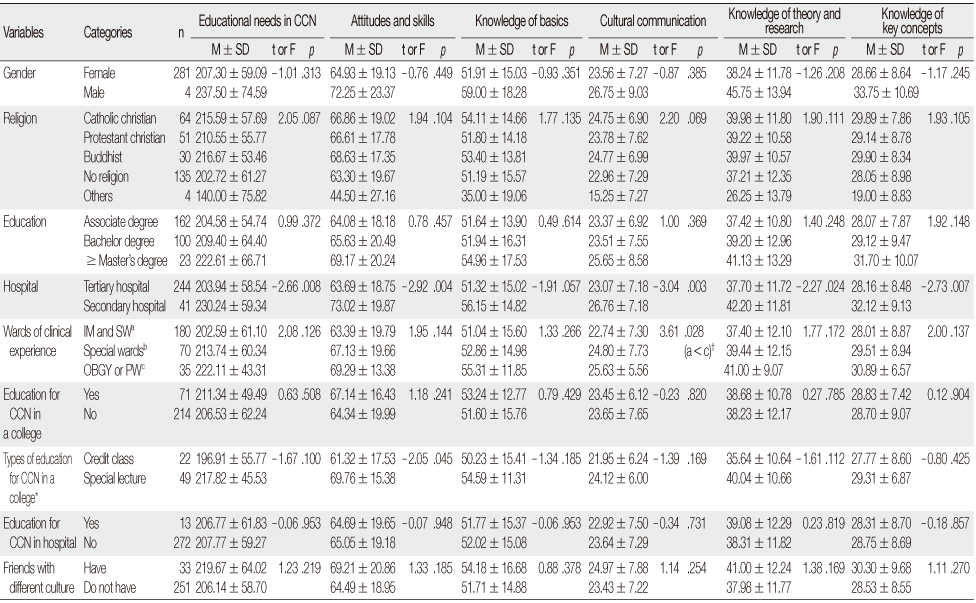
Figure & Data
REFERENCES
Citations

- The moderating effect of cultural competence educational needs on the relationship between transcultural self-efficacy and cultural competence in Korean public health nurses
Young-Ran Han, Yeo-Won Jeong
BMC Nursing.2023;[Epub] CrossRef - Educational Needs of European Intensive Care Nurses with Respect to Multicultural Care: A Mix-Method Study
Aleksandra Gutysz-Wojnicka, Dorota Ozga, Eva Barkestad, Julie Benbenishty, Bronagh Blackwood, Kristijan Breznik, Bojana Filej, Darja Jarošová, Boris Miha Kaučič, Ivana Nytra, Barbara Smrke, Renáta Zeleníková, Beata Dobrowolska
International Journal of Environmental Research and Public Health.2022; 19(2): 724. CrossRef - Factors Influencing Transcultural Self-Efficacy Among Nurses With Foreign Patient Care Experience
HyunJung Ham, Sunghee H. Tak
Journal of Transcultural Nursing.2022; 33(1): 87. CrossRef - Nursing students’ experiences of a global outreach program: A mixed-method study
Sook Ja Yang, Chiyoung Cha, Hyerim Lee, Sookyung Jeong
Nurse Education in Practice.2021; 50: 102927. CrossRef - Determinants of transcultural self‐efficacy among nurses in China: A cross‐sectional study
Ling Tong, Tong Tong, Jingping Wang, Yao Li, Ariko Noji
Nursing & Health Sciences.2021; 23(4): 880. CrossRef - Perceived cultural differences in healthcare for foreign patients visiting South Korea: tool development and measurement
Sumi Sung, Hyeoun-Ae Park
BMC Health Services Research.2019;[Epub] CrossRef - CULTURAL COMPETENCE LEVEL, ITS IMPORTANCE, AND EDUCATIONAL NEEDS FOR CULTURAL COMPETENCE AMONG NURSES CARING FOR FOREIGNERS IN KOREA
Nageong KIM, M. N., Dong-Hee KIM, Jungha PARK
Humanities & Social Sciences Reviews.2019; 7(5): 286. CrossRef - Level of Cultural Self-Efficacy of Colombian Nursing Professionals and Related Factors
Raquel Herrero-Hahn, Juan Guillermo Rojas, Rafael Montoya-Juárez, María Paz García-Caro, César Hueso-Montoro
Journal of Transcultural Nursing.2019; 30(2): 137. CrossRef - Effects of a cultural nursing course to enhance the cultural competence of nursing students in Korea
Hae Sook Park, Hee Jung Jang, Geum Hee Jeong
Journal of Educational Evaluation for Health Professions.2019; 16: 39. CrossRef - Living in Harmony: Clinical Nurses’ Perceptions of Multicultural Society
Hwa-Sook CHO, Euna PARK
JOURNAL OF FISHRIES AND MARINE SCIENCES EDUCATION.2019; 31(1): 196. CrossRef - A Literature Review of the Studies on Cultural Competency of Nurses and Nursing Students in Korea
Min-A Kim, So-Eun Choi
Journal of Korean Academy of Community Health Nursing.2018; 29(4): 450. CrossRef - Development and Cross-Validation of the Short Form of the Cultural Competence Scale for Nurses
Duckhee Chae, Yunhee Park
Asian Nursing Research.2018; 12(1): 69. CrossRef - Evidence-Based Updates and Universal Utility of Jeffreys’ Cultural Competence and Confidence Framework for Nursing Education (and Beyond) Through TIME
Marianne R. Jeffreys
Annual Review of Nursing Research.2018; 37(1): 43. CrossRef - Structural Equation Modeling of Cultural Competence of Nurses Caring for Foreign Patients
Jung-Won Ahn
Asian Nursing Research.2017; 11(1): 65. CrossRef - Cultural Competence and Influencing Factors of Dental Hygiene Students
Ji-Hyoung Han, Ki-Eun Kim
Journal of Dental Hygiene Science.2017; 17(3): 242. CrossRef - Factors Affecting Transcultural Self-efficacy among Nursing Students
Kyu Eun Lee, Nam Sun Kim
Journal of Health Informatics and Statistics.2017; 42(1): 1. CrossRef - The Effectiveness of a Cultural Competence Training Program for Public Health Nurses using Intervention Mapping
Yune Kyong Kim, Hyeonkyeong Lee
Journal of Korean Academy of Community Health Nursing.2016; 27(4): 410. CrossRef - Perceived Transcultural Self-Efficacy of Nurses in General Hospitals in Guangzhou, China
Juan Li, Zhuang He, Yong Luo, Rong Zhang
Nursing Research.2016; 65(5): 371. CrossRef - Level of Cultural Competence (CC) and Educational Needs for Cultural Competence in Nursing (CCN) in Undergraduate Nursing Students
Nae Young Lee, Yong Sook Eo, Ji Won Lee
The Journal of Korean Academic Society of Nursing Education.2015; 21(1): 16. CrossRef - Effects of a Multicultural Course on the Multicultural Acceptability and Competency of Nursing Students
Myeong Jeong Chae, Jin-il Kim, Jin Hee Lee
The Journal of Korean Academic Society of Nursing Education.2015; 21(3): 373. CrossRef - Subjective View of and Attitude toward Multiculturalism in First-year Undergraduate Nursing Students after Completing a Multicultural Subject
Eun-Ho Ha, Jin-Young Cho
Journal of Korean Academy of Community Health Nursing.2015; 26(3): 248. CrossRef - The Study on Relationship between Characteristics of Cultural Exchanges, Self-efficacy, and Cultural Competency of Nursing Students
Sun-Yi Yang
The Journal of the Korea Contents Association.2014; 14(7): 334. CrossRef - Development and Psychometric Evaluation of the Korean Version of the Cultural Competence Scale for Clinical Nurses
Duck-Hee Chae, Chung-Yul Lee
Asian Nursing Research.2014; 8(4): 305. CrossRef - Experiences of Nurses Who Provide Childbirth Care for Women with Multi-cultural Background
Sun Hee Kim, Kyung Won Kim, Kyung Eui Bae
Journal of Korean Public Health Nursing.2014; 28(1): 87. CrossRef - Development of Educational Program for Cultural Competence in Nursing for Nursing Students and its Effects
Sun-Hee Kim
The Journal of Korean Academic Society of Nursing Education.2013; 19(4): 580. CrossRef - Cultural Competence and Factors Influencing Cultural Competence in Nursing Students
Duck Hee Kim, Seong Eun Kim
Journal of Korean Academy of Psychiatric and Mental Health Nursing.2013; 22(3): 159. CrossRef
Descriptive Statistics of Study Variables (N=285)
CCN=Cultural competence in nursing; TSE=Transcultural self-efficacy; OBGY=Obsterics & gynecology.
*Japanese, Chinese, Vietnamese, etc; †Impertinent data were excluded.
Differences in Total TSE and Subcategories according to Study Variables (N=285)
TSE=Transcultural self-efficacy; CCN=Cultural competence in nursing; IM and SW=Internal medicine and surgery wards; OBGY=Obsterics & gynecology; PW=Pediatrics wards.
*Impertinent data were excluded. †Scheffe´ test.
Differences in Total Educational needs in CCN and Subcategories according to Study Variables (N=285)
TSE=Transcultural self-efficacy; CCN=Cultural competence in nursing; IM and SW=Internal medicine and surgery wards; OBGY=Obsterics & gynecology; PW=Pediatrics wards.
*Impertinent data were excluded; †Scheffe´ test.
Correlations among Study Variables (N=285)
TSE=Transcultural self-efficacy; CCN=Cultural competence in nursing; Variable 2, 3, and 4 are subcategories of TSE; Variable 6, 7, 8, 9, and 10 are subcategories of educational needs in CCN.
Influencing Factors on TSE (N=283)
TSE=Transcultural self-efficacy; CCN=Cultural competence in nursing.
*Dummy variables.
CCN=Cultural competence in nursing; TSE=Transcultural self-efficacy; OBGY=Obsterics & gynecology. *Japanese, Chinese, Vietnamese, etc; †Impertinent data were excluded.
TSE=Transcultural self-efficacy; CCN=Cultural competence in nursing; IM and SW=Internal medicine and surgery wards; OBGY=Obsterics & gynecology; PW=Pediatrics wards. *Impertinent data were excluded. †Scheffe´ test.
TSE=Transcultural self-efficacy; CCN=Cultural competence in nursing; IM and SW=Internal medicine and surgery wards; OBGY=Obsterics & gynecology; PW=Pediatrics wards. *Impertinent data were excluded; †Scheffe´ test.
TSE=Transcultural self-efficacy; CCN=Cultural competence in nursing; Variable 2, 3, and 4 are subcategories of TSE; Variable 6, 7, 8, 9, and 10 are subcategories of educational needs in CCN.
TSE=Transcultural self-efficacy; CCN=Cultural competence in nursing. *Dummy variables.
 KSNS
KSNS
 E-SUBMISSION
E-SUBMISSION
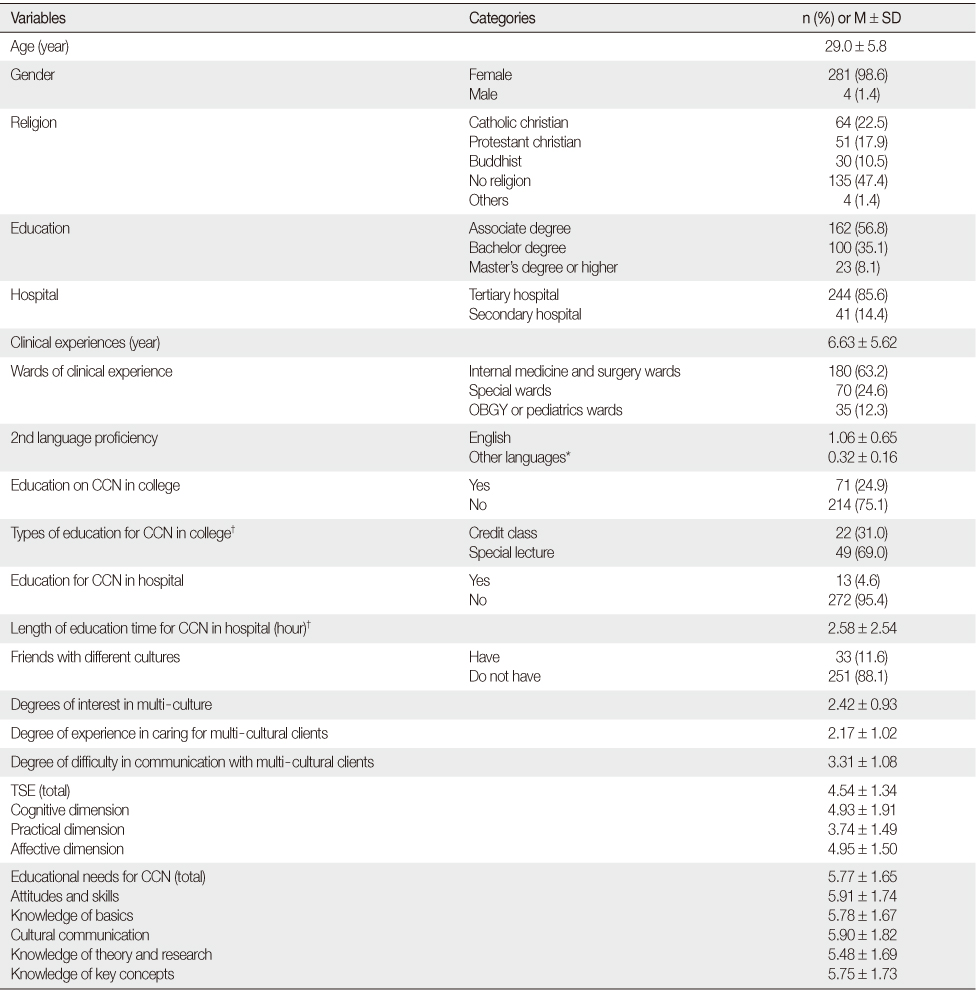
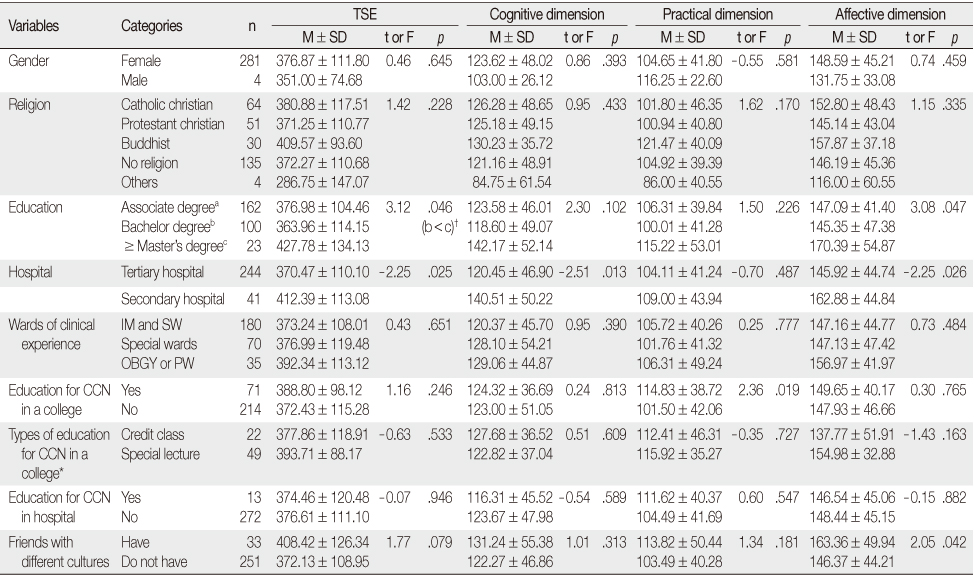
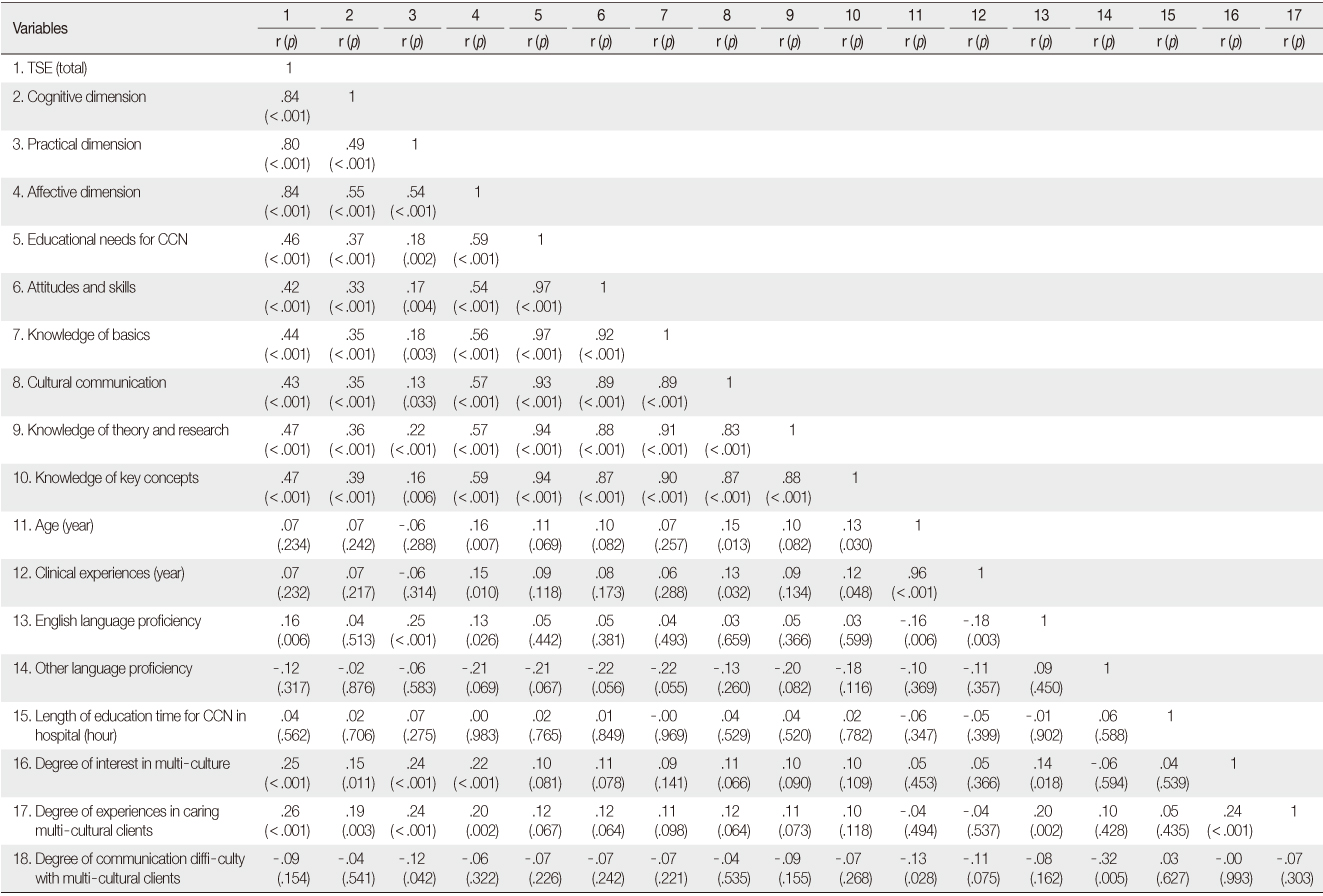
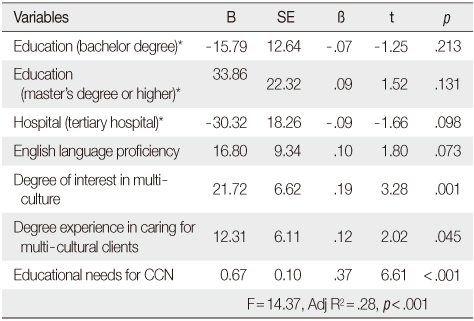
 Cite
Cite

